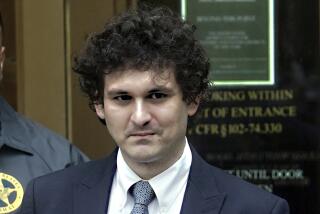Big Board Needs Big Reform
- Share via
Confidence remains in short supply among the investors who keep capitalism afloat. Still reeling from fake profit reports, they are now being battered by scandals in mutual funds. It is in this glum context that the New York Stock Exchange addresses its own crisis of confidence, the worst in its 211-year history.
Since NYSE Chairman Richard Grasso walked out the door Sept. 17 with his infamous $188-million paycheck, new revelations have tumbled out about allegedly illegal activity by NYSE member firms that profited from insider information. Big pension investors openly grumble that the NYSE’s trading rules unfairly enrich the privately owned institution’s owners. The world’s largest stock exchange has responded by offering to crack open a window when it should be throwing wide the front door to reform.
Computerized trading and the rise of stock exchanges around the world are opening new trading avenues for investors, yet the world’s dominant stock exchange retains both symbolic and practical importance in keeping the stock market orderly and safe. It has to be trustworthy.
Acting NYSE Chairman John S. Reed aimed at the right target with his proposal to unseat the current oversized and clubby board of directors. He also wants a separate committee to oversee the stock exchange’s flabby in-house regulators. However, his arsenal is too small.
No one guarantees that powerful NYSE owners -- who reserve the right to elect future directors -- won’t again populate the boardroom with cronies. Reed also fails to grapple with the underlying cause of the exchange’s insider trading scandal, sparked by trading specialists who allegedly profited while handling investors’ stock trades.
The federal government allows the exchange to control its own regulation. The Nasdaq stock exchange transferred its regulatory arm to an independent institution a few years ago. The NYSE should too. If it doesn’t, Congress and the White House should order the Securities and Exchange Commission, which has the final say over reforms, to take over enforcement.
Congress and the SEC have started prescribing tough medicine for investment firms, accountants and publicly traded companies. The NYSE is part of the same web. Weak reforms there will dampen the recovery of confidence for all U.S. stock markets.
More to Read
Inside the business of entertainment
The Wide Shot brings you news, analysis and insights on everything from streaming wars to production — and what it all means for the future.
You may occasionally receive promotional content from the Los Angeles Times.










